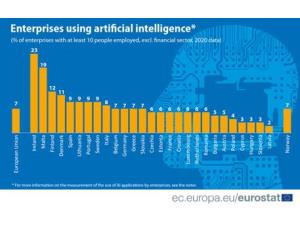



Date:15/04/21
 Artificial intelligence (AI) is an area of strategic importance and a key driver of economic development. It can provide solutions to many challenges, such as treating diseases or minimising the environmental impact of farming. Artificial intelligence gives machines and systems the capability to analyse their environment and make decisions with some degree of autonomy to achieve specific goals.
Artificial intelligence (AI) is an area of strategic importance and a key driver of economic development. It can provide solutions to many challenges, such as treating diseases or minimising the environmental impact of farming. Artificial intelligence gives machines and systems the capability to analyse their environment and make decisions with some degree of autonomy to achieve specific goals.
In 2020, 7% of enterprises in the EU with at least 10 people employed used AI applications. While 2% of the enterprises used machine learning to analyse big data internally, 1% analysed big data internally with the help of natural language processing, natural language generation or speech recognition. A chat service, where a chatbot or virtual agent generated natural language replies to customers, was used in 2% of the enterprises. The same proportion of enterprises, 2%, used service robots, which are characterised with some degree of autonomy, for example to carry out cleaning, dangerous or repetitive tasks such as cleaning up poisonous substances, sorting items in the warehouse, helping customers in shopping or at payment points etc.
Among the EU Member States, Ireland recorded the highest share of enterprises (23%) that used any of the four considered AI applications in 2020. Other countries with widespread uptake of AI technologies were Malta (19%), Finland (12%) and Denmark (11%).
In contrast, less than 10% of enterprises used any of the four AI applications in 2020 in all other Member States. The lowest shares were recorded in Latvia (2%), Slovenia, Hungary, Cyprus (3% each) and Poland (4%).
Artificial intelligence in EU enterprises
 Artificial intelligence (AI) is an area of strategic importance and a key driver of economic development. It can provide solutions to many challenges, such as treating diseases or minimising the environmental impact of farming. Artificial intelligence gives machines and systems the capability to analyse their environment and make decisions with some degree of autonomy to achieve specific goals.
Artificial intelligence (AI) is an area of strategic importance and a key driver of economic development. It can provide solutions to many challenges, such as treating diseases or minimising the environmental impact of farming. Artificial intelligence gives machines and systems the capability to analyse their environment and make decisions with some degree of autonomy to achieve specific goals.In 2020, 7% of enterprises in the EU with at least 10 people employed used AI applications. While 2% of the enterprises used machine learning to analyse big data internally, 1% analysed big data internally with the help of natural language processing, natural language generation or speech recognition. A chat service, where a chatbot or virtual agent generated natural language replies to customers, was used in 2% of the enterprises. The same proportion of enterprises, 2%, used service robots, which are characterised with some degree of autonomy, for example to carry out cleaning, dangerous or repetitive tasks such as cleaning up poisonous substances, sorting items in the warehouse, helping customers in shopping or at payment points etc.
Among the EU Member States, Ireland recorded the highest share of enterprises (23%) that used any of the four considered AI applications in 2020. Other countries with widespread uptake of AI technologies were Malta (19%), Finland (12%) and Denmark (11%).
In contrast, less than 10% of enterprises used any of the four AI applications in 2020 in all other Member States. The lowest shares were recorded in Latvia (2%), Slovenia, Hungary, Cyprus (3% each) and Poland (4%).
Views: 313
©ictnews.az. All rights reserved.Similar news
- Azerbaijani project to monitor disease via mobile phones
- Innovative educational system to be improved under presidential decree
- NTRC prolongs license of two TV and radio organizations for 6 years
- Azerbaijan establishes e-registry for medicines
- Azerbaijani museum introduces e-guide
- Nar Mobile opens “Nar Dunyasi” sales and service center in Siyazan city
- International conference on custom electronic services held in Baku
- OIC secretary general to attend COMSTECH meeting in Baku
- Azerbaijan develops earthquake warning system
- New law to regulate transition to digital broadcasting in Azerbaijan
- Azerbaijani State Social Protection Fund introduces electronic digital signature
- Intellectual traffic management system in Baku to be commissioned in December
- Tax Ministry of Azerbaijan started receiving video-addresses
- World Bank recommends Azerbaijan to speed up e-service introduction in real estate
- Azerbaijan to shift to electronic registration of real estate





















